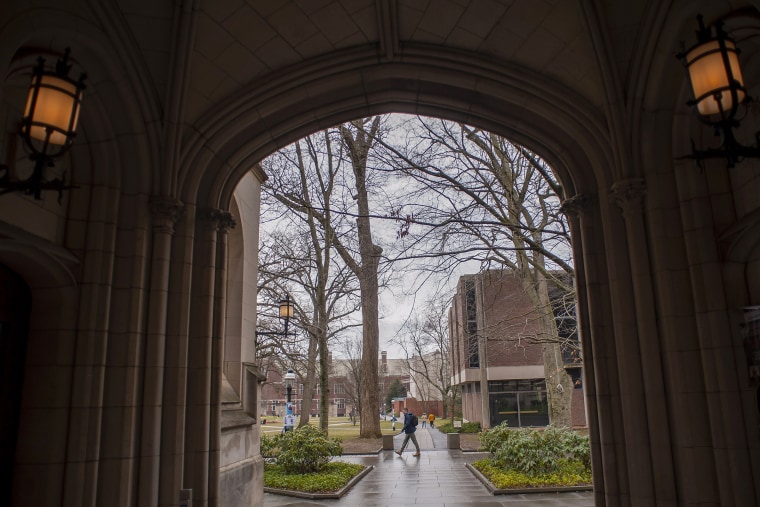With the recent uptick in Covid-19 cases, colleges and universities across the country are making spring semester changes to keep the highly transmissible omicron variant away from campus.
While some public health experts said omicron might result in fewer hospitalizations, especially in vaccinated people, the new variant is responsible for a sudden increase in infections. It accounted for about 59 percent of U.S. Covid-19 infections in the week ending Dec. 25, according to the Centers for Disease Control and Prevention.
In response, several institutions — including Howard, Princeton and Syracuse universities — are delaying the start of the spring semester by about a week.
“Because the pandemic continues and the highly transmissible omicron variant presents yet another challenge to public health, the university has decided to organize a gradual return for undergraduate students,” Jill Dolan, dean of the college at Princeton University, and W. Rochelle Calhoun, vice president for campus life, wrote in a memo.
Other schools — including most campuses in the University of California system, Stanford University and Northwestern University — announced plans to begin the spring semester with remote learning.
Anna Bershteyn, assistant professor in the department of population health at the New York University Grossman School of Medicine, said the best mitigation method — delaying or going remote — depends on the school’s culture, but all institutions should look further into the future and prepare beyond the upcoming semester.
“From my perspective, omicron is, in some ways, a lucky break and a warning to us,” Bershteyn said. “Even though it does reinfect people, evade our prior immune response and spread very easily, it is milder, and I don’t think that had to be true. I think it’s absolutely possible in the future for a highly mutated variant to be a lot deadlier.”
Bershteyn explained that many schools have the infrastructure to create safe environments for their students by establishing well-ventilated rooms with air purifiers, requiring readily available Covid-19 testing, mandating masks and encouraging or mandating vaccination and boosters. With all of these measures in place, she said an educational institution has the potential to be one of the safest places — and this should largely be the focus right now.
“For some people, it might be safer for them to be on campus if all those controls are in place compared to whatever the alternative is, depending on what their alternative is,” Bershteyn said.
As the new year approaches and students wind down from their holiday breaks, colleges and universities across the country are announcing booster shot requirements. More than a thousand schools already require Covid-19 vaccinations, and an increasing number are announcing booster shot requirements.
“For colleges that haven’t required vaccination, they should,” Gigi Gronvall, a senior scholar at the Johns Hopkins Center for Health Security at the Bloomberg School of Public Health, said. “They should require booster shots, which should be available to everybody who is of age to go to college.”
Gronvall explained that widespread vaccination and booster shot mandates are especially necessary when thinking about medically “vulnerable people who are fully up to date with their vaccines and nonetheless at risk for severe outcomes.”
California State University, the largest four-year university in the country, with a student population of about 485,549 students, will require all eligible students, faculty and staff across 23 campuses to get a booster shot by Feb. 28.
Howard University announced Monday that all faculty and students, with the exception of approved medical and religious exemptions, will be required to get a Covid-19 booster shot by Jan. 31. The booster shots are available on campus.
“The bottom line is that you are more protected if you are vaccinated,” Anthony K. Wutoh, Howard University’s provost and chief academic officer, and Hugh Mighty, senior vice president for health affairs, said in a news release.
As variants arise and institutions adjust, Gronvall no longer imagines a future without Covid-19 but instead encourages people to consider incorporating safety measures into everyday life, planning to social distance and Covid-19 test in the brisker months while looking to the summer for potential reprieve. She said the key to our “newfound normal” is to keep the most physically vulnerable people in mind, mask, vaccinate and adapt as things change.
“The things that we can do are pretty much the same as before,” Gronvall said. “There is no variant that is magic, and we have a lot of tools that can be helpful.”
